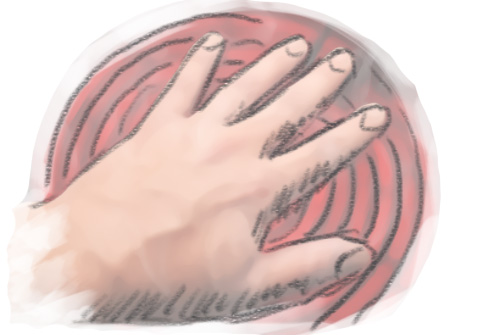So we just learned that our minds place a lot of stress on our physical bodies through tensed muscles and through the release of harmful chemicals in our bodies.
We also learned that, the first part of a successful meditation is to fully relax the body and calm all the senses.
Lets find out how the senses work.

How does our body sense the world around us?
So we’re all familiar with sight, sound, smell, touch and taste. We use them every day without giving them a second thought.
How do our senses work? Our bodies are constantly receiving information from the world around us in the form of vibrations. And each of our senses is optimized to detect vibrations of different types and different frequencies.
Our eyes detect vibrations in the visible light spectrum and the particular frequency determines the color we see. The light is received by the eye. Converted into an electrical signal and passed to the brain.
This is important, so read this slowly – The MIND interprets that information to BUILD a picture.
So simply put, the world around you is vibrating. Different frequencies are detected by different sense organs in the body. The organs convert those to electrical signals that get passed to the brain where the mind creates an impression of the world around us.
Sound is the same. Vibrations in the air move tiny hairs in the inner ear that are converted to electrical signals. Those are passed to the brain. Interpreted by the mind to build a picture of the world around us. Smell, taste, touch all work the same way.
What this means is that all of your experiences of the world around you are created inside your mind.
Curious Hermit
Your body is constantly flooded with information from all of your senses. Your mind is the thing that determines what gets your attention. It reviews all the millions of signals that are received constantly and looks for changes.
I’ll say that again – it looks for CHANGES. Differences between the last snapshot in time.
So for example. If your hand is at a constant temperature, it doesn’t get noticed. But if you rest your hand on a hot stove which is a much higher temperature, your mind would notice it right away and draw your attention to it.

Holding an ice cube would have the same effect. It’s such a big change in temperature, that your mind singles it out and draws it to your attention.
Skin isn’t good at measuring an actual temperature. You can’t touch a counter top and say, “mmmm, that’s about 74 degrees”. But it can tell if the counter top feels hotter or colder than your skin currently feels.
As long as the temperature of the counter top is not too different from your hand, if you let your hand sit perfectly motionless on it, eventually the sensation of being able to feel the counter top fades to nothing.
It works with all our senses. As long as there are no large changes detected, the senses slowly become still. Become numb.
The room around you is full of sounds, but you have probably tuned most of them out and don’t become aware of them unless there’s a change in the sound. A bump or a bang.
Essentially, your mind filters the world around you based on which of your senses shouts loudest.

Why does your mind do this?
Your mind has evolved to become a phenomenal “fear based survival computer” as I like to call it. Your mind is trying to keep you alive by constantly looking for danger.
A snapping twig signals an approaching tiger (or squirrel). A flash of movement could be an animal stalking you or potential dinner. A sudden change in temperature, you just stepped in the fire.
So it’s just constantly looking for whatever sense is shouting about the most change and filtering out anything that seems fairly stable. It’s trying to keep you alive. Looking for real danger and predicting potential danger.
If you stubbed your toe, your full attention would be drawn to the pain. But if while you were hopping up and down, you got stung by a hornet, you would instantly forget about your toe.
Hopping Hermit
So – for meditation to be effective, the first thing we have to do is to eliminate as many of those external physical sensations (distractions) as possible.
Calm the body and make it as neutral as possible.
How can we do that??
Well click on the next section and we’ll take a look at how to set up your meditation environment for the best chance of success.
Meditation Boot Camp – Quick Navigation
- Meditation Roots – the history of meditation
- Why Meditate? – why do we need to meditate
- Physical Relaxation – the importance of physical relaxation for meditation
- Meditation Environment – how to set up the perfect environment for meditation
- Best Meditation Posture – different meditation postures that work for everyone
- Breathe Properly – both energize and relax your body by breathing properly
- Breathing Practice – simple breathing exercise before meditating
- Subtle Sensations – becoming aware of your body
- Stop the Mind – stopping the mind from chattering
- Entertain the Monkey – giving the mind a task during meditation
- Follow the Breath – focusing on breathing during meditation
- Simple Breathing Meditation – putting it all together in meditation
- Meditation is a Journey – make meditation a lifelong practice